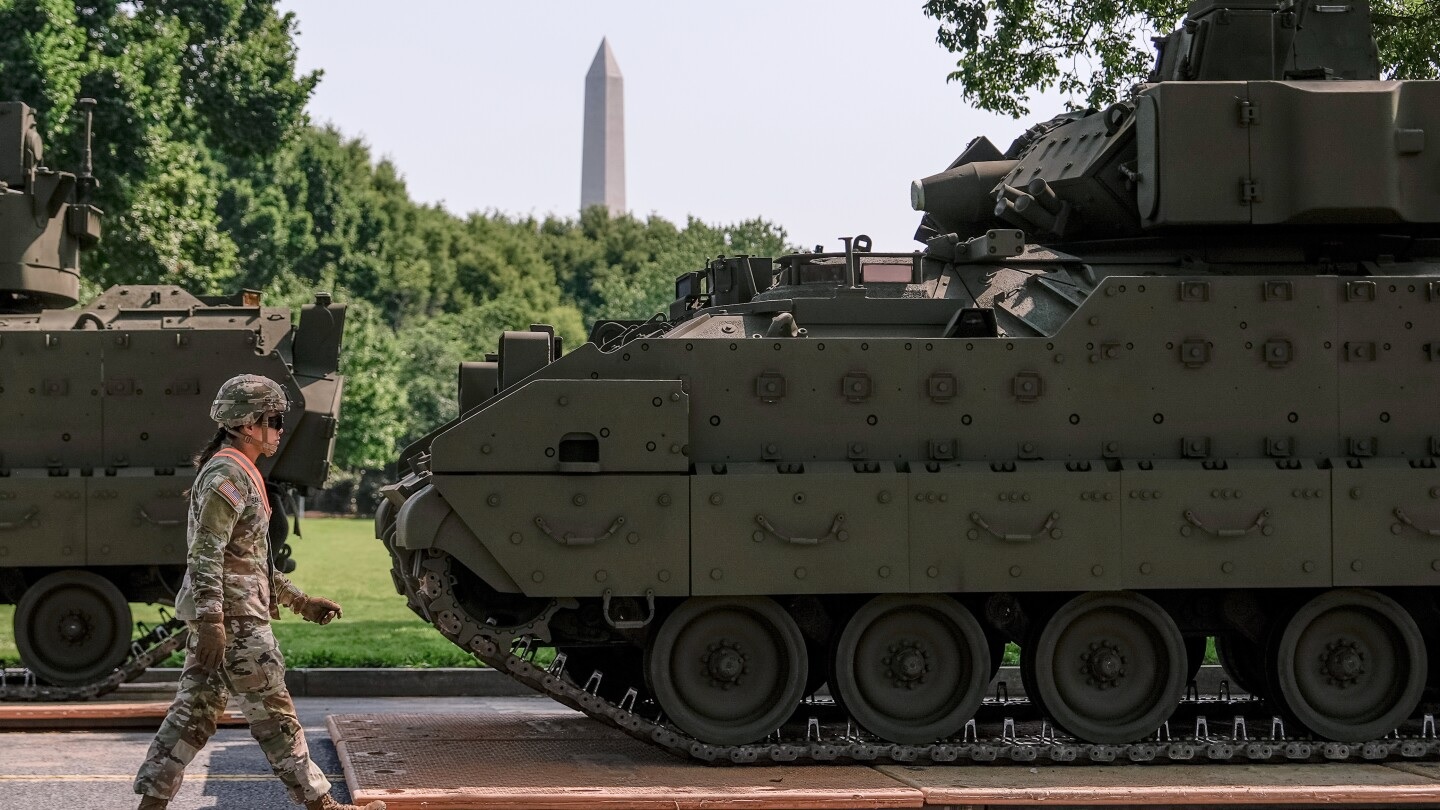Residents of Washington, DC, witnessed unusual activity on Rhode Island Avenue this week, as flatbed trucks carrying military tanks, accompanied by police escorts, made their way through the city.
These convoys, navigating the route that connects suburban areas to downtown, created significant traffic disruptions.
Even more disturbances are expected as the city prepares for a large-scale military parade this Saturday, June 15, 2025, celebrating the U.S. Army’s 250th anniversary, a date that also coincides with Donald Trump’s 79th birthday.
President Trump addressed the occasion earlier this week, saying, “I think it’s time for us to celebrate a little bit. You know, we’ve had a lot of victories.”
While he acknowledged that the event falls on his birthday, he emphasized that it is more about commemorating Flag Day.
DC’s population, numbering over 700,000, is accustomed to public spaces being taken over by political events.
Notably, Trump drew large crowds to the White House Ellipse on January 6, 2021, a gathering that contributed to the Capitol attack later that day.
Though the parade itself is expected to last only a few hours, surrounding road closures will extend for up to four days.
Additionally, flights from Ronald Reagan Washington National Airport will be halted for an unspecified period during the festivities.
The parade will showcase thousands of troops and armoured vehicles, including M1A2 Abrams tanks and aircraft.
It will also showcase horses, and even a few mules, traveling eight blocks along Constitution Avenue from the Lincoln Memorial to just beyond the White House.
The strain these heavy military vehicles place on roads designed for lighter traffic could leave the city with costly repairs.
The event also makes Washington the second U.S. city where Trump has recently deployed troops, albeit for different purposes.
In Los Angeles, he ordered the federalization of California National Guard units and deployed U.S. Marines against the wishes of local authorities.
He justified this move as necessary to assist immigration enforcement, sparking concerns that he is normalizing the use of military force for domestic political purposes.
Saturday’s parade will be the first of its kind in Washington since 1991, when then-President George H.W. Bush honored troops returning from the Gulf War.
Trump has warned that any protests on the day “will be met with very heavy force.”
Political leaders in the heavily Democratic city have expressed strong opposition.
Delegate Eleanor Holmes Norton, DC’s non-voting representative in Congress, condemned the event as a “performative military parade in the style of authoritarian leaders” that serves no legitimate purpose.
Mayor Muriel Bowser, while more restrained in her criticism, highlighted the city’s efforts to manage the anticipated crowds, which the Secret Service estimates could number in the hundreds of thousands.
Bowser also expressed concern about the potential damage to DC’s infrastructure. “These are, for the most part, local streets,” she said. “If they’re rendered unusable, we have to repair them and then seek reimbursement from the federal government.” Her office declined further comment.
An Army spokesperson, Heather J. Hagan, estimated the parade’s cost to fall between $25 million and $45 million.
She said tanks would be fitted with rubber pads, and steel plates would be placed along the route to minimize road damage, but did not clarify who would pay for any necessary repairs.
Local opposition has also come from elected advisory neighborhood commissioners.
A resolution passed this week by Capitol Hill representatives criticized the parade as undemocratic and urged its cancellation.
Jim Malec described the disruption as significant and noted that it comes only months after the city cleared homeless encampments in that same area at Trump’s urging.
Malec is a commissioner from the Foggy Bottom area near the parade route.
“It’s appalling that we’re spending $45 million on a parade after displacing our most vulnerable residents,” Malec said.
Washington and its surrounding areas have faced increased scrutiny and policy changes since Trump’s return to office.
His administration’s push to reduce the federal workforce has raised fears of economic downturns in DC and nearby regions.
At the same time, Republican leaders in Congress have passed laws restricting the district’s autonomy, including overturning local voting rights for noncitizens and blocking police union reforms.
Samuel Port, a former Army logistics officer who lost his federal contracting job when the Trump administration shut down USAID, criticized the parade’s logistics and intent.
“These tanks are going to damage roads, overheat the area, and pollute the air,” he said.
While he believes in honoring military history, Port sees the event as self-serving. “Trump is using this to glorify himself.
It turns soldiers into political props and disrespects their service.”







